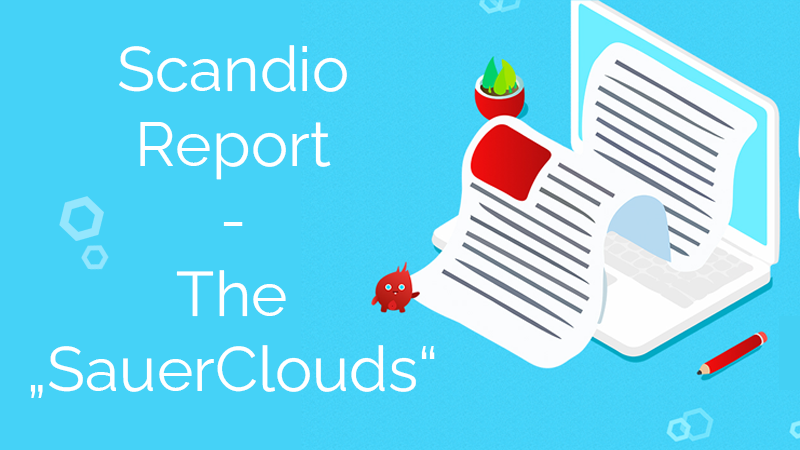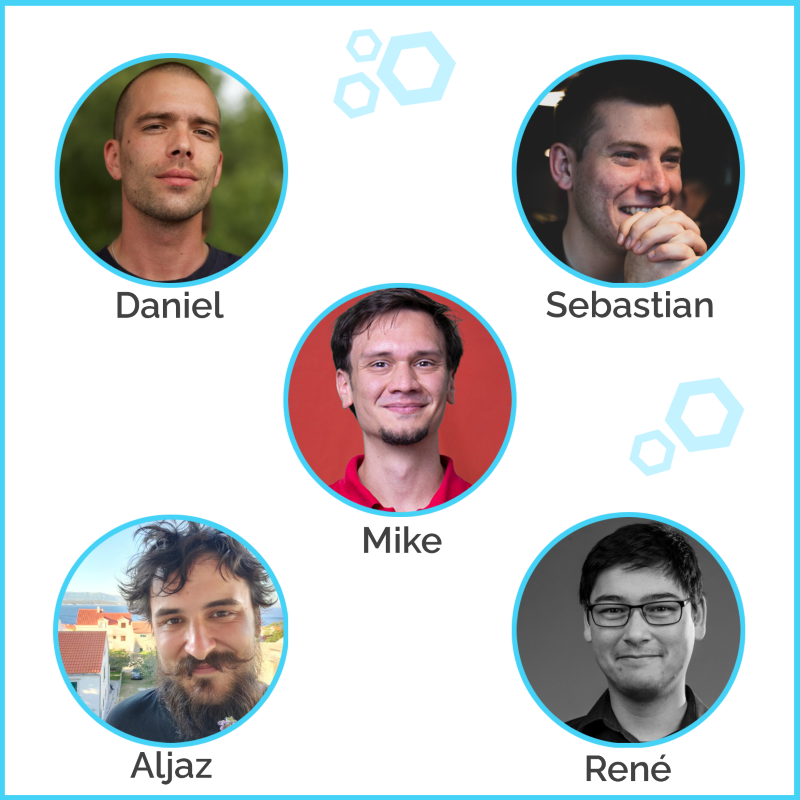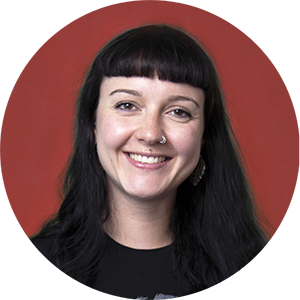2021-08-30 | Verena Stiegler | 5 min read
Scandio-Report - The "SauerClouds"

It’s time for another Scandio Report! This time we introduce you to the “SauerClouds”, our specialists in the world of Cloud & Systems Engineering. Find out what fascinates them about their job, what cloud trends to expect in the near future and how they came up with their peculiar name.
Please introduce yourselves briefly!
Mike: We are the “SauerClouds” and consist of 14 people working in full-time, 3 working students… and one retiree! As our name suggests, we deal with everything concerning the cloud with a focus on automated infrastructure.
Aljaz: Let me read you our mission statement: “We automate repetitive work to build and maintain reliable and innovative solutions for our customers.”
How did you come up with the name SauerClouds? Do you have a clown on your team?
Mike: Aljaz!
Aljaz: We first had a poll for name suggestions, among them was “SauerClouds”. The suggestion actually was mine - I had picked it up somewhere.
Mike: And to be sure, we’re not as lame as our Development Cluster, which took a vote and then called itself the “Development Cluster.” (laughs)
Aljaz: Actually, we’re all fun guys, which is why our team works so well.
What does a day at SauerClouds look like? Do you have any common rituals?
Sebastian: Since some of us are working together on a big project, we have our own specific rituals. I think that’s pretty much the same for all projects.
Mike: When I’m at the office, my ritual is playing table tennis! (laughs)
Sebastian: And with Mike, we have our official garlic responsible, who cooks dishes with lots of garlic every week on “Garlic Tuesday”.
What projects are you working on at the moment?
Daniel: Our biggest project has now been up and running for 6 years. We operate a platform as a service in the smart home environment based on AWS and CloudFoundry. This means that we provide all developers in the environment with a platform on which they can deploy their microservices. We also provide all additional services such as monitoring, logging, distributed tracing and databases. Since we’re using a pretty extensive technology stack there, the project is also a great way to learn about a wide variety of technologies.
Mike: In our second largest project, we support the Atlassian stack of a large German automobile manufacturer. This project also has been running for 6 years now. The great thing about it is, that we were involved from the very beginning and were able to help shape a lot.

What’s the most exciting/fascinating thing about your job?
Mike: There is always something new to learn. Personally, I’m really passionate about automation in general. Because the thing is: if you do it very well, part of your actual work becomes redundant at the same time. (laughs) But at the same time, we’re eliminating boring tasks and turn them into something exciting!
René: You get in touch with a lot of technologies and it certainly doesn’t get boring.
Daniel: Even though our focus is on the cloud, you inevitably get in touch with all the services you support. So you also have to be familiar with the features of the actual software. It’s quite a diverse spectrum that you’re working with.
Aljaz: I find it fascinating that you can create something with just a few clicks.
Sebastian: I only have to make one click and almost everything else runs completely automatically in the background. I think it’s cool to see something like this grow over time and to co-create it.
How do you keep up to date with cloud technologies? Do you regularly attend training courses etc.?
René: We have to refresh our certifications on a regular basis, such as AWS or Azure, and of course we get all the news there.
Mike: Before Corona, the User Groups were a good way to exchange ideas. I was a regular participant in the AWS User Group in Munich, for example. There you get a summary of updates on new services on AWS. Also, you always learn a lot in the projects themselves.
What’s your favorite technology?
Sebastian: For me, it’s definitely Kubernetes. I love that it’s so versatile - I can run it on a big provider like AWS or a small provider like Hetzner. In my opinion, these days nothing works without containers. You should convince more people about containers!
René: That depends on the level of abstraction you’re talking about. In this case, I think Linux is also a cool technology, since almost all server tasks run on it, which few people in the non-techie environment know.
Aljaz: But we won’t get anywhere without Terraform, either. (laughs)
Mike: In my opinion, we should also focus more on serverless technologies. I expect this topic to become an even bigger issue. But I guess it will take a few more years for the big companies to realize this.
Then have a look at our job offers!
How do you organize yourselves in terms of self-organization?
Sebastian: We have three regular meetings every week. There is the weekly “Krautspiracy” (don’t ask me how we came up with THAT name), which is about how the cluster members are doing in general and what’s new. Every two weeks we organize a talk in the cluster on a technical topic where everyone is attending. Then we have a weekly talk in which the project teams share what they’re working on, what they’ve learned, etc.
Daniel: These meetings are especially important for people who are only working on a single project to get out of their “bubble” for a minute.
Mike: Since we are smaller than the other clusters, it’s easier for us to schedule regular meetings with everyone.
If you were to make a prediction for the future, what will be the big thing in the cloud environment soon?
Daniel: Kubernetes will be the future, be it serverless or whatever is built on top of it. With Kubernetes we will be able to simplify a lot of things even further - there’s still plenty of room for growth!
Mike: I believe that multi-cloud and hybrid solutions will be increasingly requested. Especially for customers who have been hesitant with moving to the Cloud so far, hybrid will be the first step towards the cloud.
Thanks a lot for your time and the exciting insights behind the scenes of Scandio!
Scandiolife on Instagram
Look what Scandio is tweeting



